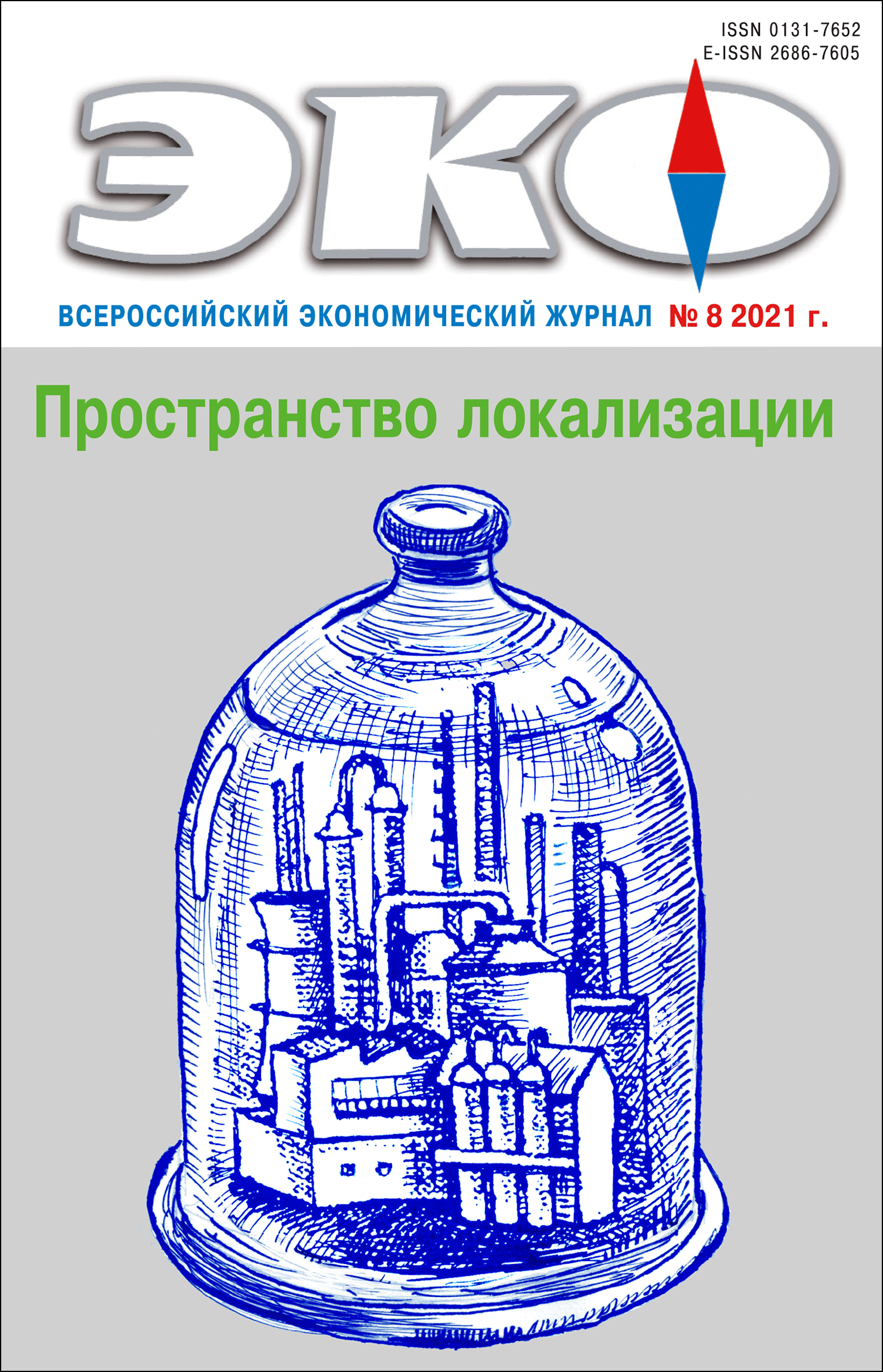ASPECTS OF REAL ECONOMY
Published 2021-08-02
Keywords
- global economy,
- development strategy,
- institutes,
- industrial policy,
- quality of economic growth
- manufacturing sector,
- investment. international comparisons ...More
How to Cite
1.
Alekseev А. The Russian Manufacturing Sector. A Time to Cross the Lines. ECO [Internet]. 2021 Aug. 2 [cited 2026 Jan. 14];51(8):104-26. Available from: https://ecotrends.ru/index.php/eco/article/view/4297
Abstract
The paper explains why the Russian economy’s strategy of passive embedding into the global economy is unacceptable. The characteristics of national economy transformation into a resource-based economy are considered; the growing irreversibility of this type of development is discussed. It is concluded that the uncritical attitude towards world economy processes is the foundation for the substitution of the basic roles of the state in its economy regulation, the shifting of focus from creating conditions for national manufacturers development to the increasingly strict control of the national goods and services market, which is shrinking under the pressure of the global economy. On the basis of international comparisons, it is made clear that the current investment policy in the manufacturing sector of Russian industry is unacceptable. The author puts forward some solutions to restore manufacturing activities with due regard to the existing financial resources.References
- Аганбегян А. Г. Как возобновить социально- экономический рост в России? – DOI: 10.38197/2072–2060–2020–222–2–164–182 // Научные труды Вольного экономического общества России. 2020. Т. 222. № 2. С. 164–182.
- Алексеев А. В. О повышении рыночной стоимости основного капитала в России // Проблемы прогнозирования. 2020. № 5. С. 33–45 (расчетные данные уточнены с учетом обновления данных на сайтах Росстата и Бюро экономического анализа (США)).
- Алексеев А. В., Кузнецова Н. Н. Долгосрочные тенденции производства промышленной продукции и инвестиционная динамика в РФ // Инвестиционный процесс и структурная трансформация российской экономики: монография / под редакцией А. В. Алексеева, Л. К. Казанцевой; Институт экономики и организации промышленного производства Сибирского отделения Российской академии наук. Новосибирск: Изд-во ИЭОПП СО РАН, 2020. Гл. 1. С. 14.
- Алексеев А. В., Нефёдкин В. И. Поможет ли государственно-частное партнерство выйти из стагнационной ловушки? DOI: 10.30680/ECO131–7652–2018–12–91–109 // ЭКО. 2018. № 12. С. 91–109.
- Афонцев С. А. Национальная экономическая безопасность: на пути к теоретическому консенсусу // Мировая экономика и международные отношения. 2002. № 10. С. 30–39.
- Крюков В. Наше руководство не знает российской экономики / интервью подготовил А. Механик // Эксперт. 2020. № 12, 16–22 марта. С. 49.
- Некипелов А. Влияние глобализации на реаллокацию ресурсов в переходных экономиках. Проблемы теории и практики управления. 2003. № 2. С. 10.
- Полтерович В. М. Реформа государственной системы проектной деятельности, 2018–2019 годы // Terra Economicus. 2020. № 18(1). С. 6–27. DOI: 10.18522/2073–6606–2020–18–1–6–27
- Порфирьев Б. Н., Широв А. А., Узяков М. Н., Гусев М. С., Шокин И. Н. Основные направления социально-экономического развития в 2020–2024 гг. и на период до 2035 г. // Проблемы прогнозирования. 2020. № 3. С. 4
- Райнерт Э. Как богатые страны стали богатыми, и почему бедные страны остаются бедными. М.: ГУ ВШЭ, 2021. 384 с.
- Рогов С. М. Новая холодная война: последствия для российского общества. DOI: 10.31857/S0869587320030196 // Вестник Российской академии наук. 2020. Т. 90. № 3. С. 279–292.
- Фирсов И. В. Проблемы нормативно-правового определения понятия «экономическая безопасность российской федерации // Вестник Московского университета МВД России. 2012. № 7. С. 211–217.
- Шваб К. Четвертая промышленная революция. М.: Эксмо, 2016. 138 с.
- Byeau M. Unions douanieres el donnees nationales. Economie appliquee. 1950. Vol. 3. P. 121–157.
- Cowan R., Soete L., Chervonnaya O. Knowledge Transfer and the Service Sector in the Context of the New Economy//MERIT-Infonomics Research Memorandum Series. 2001. Vol. 21. P. 17.
- Myrdal G. Economic Theory and Underdeveloped Regions. Harper & Row, 1971. 168 p.
- Nugent Neill. The EU and the 10+2 Enlargement Round: Opportunities and Challenges in ―European Union Enlargement‖ edited by Nugent Neill. PalgraveMacmillan. 2004.
- Tinbergen J. International Economic Integration. Amsterdam, 1954.
- Wessner C. W., Wolff A. Wm. Rising to the Challenge: U. S. Innovation Policy for Global Economy. Washington, DC: The National Academies Press, 2012. P. 26.

